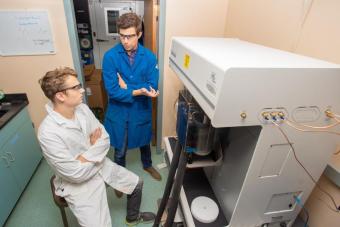
Direct Air Capture (DAC) is a relatively new technology that captures carbon from the air and enables subsequent sequestration underground.
As it stands, though, the process for DAC requires petroleum-sourced products for the molecules that trap the carbon.
Michael McGuirk, assistant professor of chemistry at Mines, recently won a $50,000 award from the Research Corporation for Scientific Advancement’s (RSCA) Negative Emissions Science Scialog program to conduct research exploring opportunities to replace petroleum in this process with polyolefin waste, the largest type of post-consumer plastic.
“We are finding a place to put plastic waste and dealing with an environmental issue simultaneously,” McGuirk said. “It’s those compounding environmental benefits that really excite and motivate me.”
Currently, the molecules used for DAC are amino-polymers that have their origins in petroleum-based molecules. This isn’t a huge concern right now, as DAC is a newer technology and isn’t being used widely just yet.
However, McGuirk said, to have impactful DAC on a global scale, the manufacturing of these amino-polymers from petroleum-sourced molecules pose both safety and infrastructure concerns – not to mention that the amount of petroleum needed for DAC on that scale could largely defeat the purpose of using direct air capture technology globally.
Meanwhile, polyolefin-based plastics, such as LDPE, HDPE and PP, make up 60 percent of post-consumer plastic waste.
What’s interesting, McGuirk said, is that polyolefin-based plastic waste is made of very similar molecules to that of the current petroleum-based polymers used for DAC. This is because much of the consumer plastic waste was originally made with the same petroleum used to make amino-polymers for DAC. The switch to using harvested molecules from polyolefin waste would take advantage of the petroleum resources that have already been drilled and turned into plastic.
“It’s solid oil sitting in landfills,” McGuirk said.
The Scialog award will allow McGuirk and his team to conduct research to break down the plastic and convert it into amino-polymers that they can use for DAC. He emphasized the need for this process to be as efficient and low energy as possible to optimize the environmental benefit.
Scialog, short for science dialog, was created in 2010 by RCSA, and will fund a year’s worth of experimentation to launch the research project and prepare to present to additional federal agencies and private sources for funding to build on initial discoveries.
A Scialog fellow, McGuirk was invited to a conference in Tuscon, Arizona in November 2023. After two days of brainstorming and collaboration, his newly formed team and their idea for utilizing polyolefin waste for DAC was chosen for a Scialog award, along with 19 other researchers’ ideas. Collaborating on the Scialog project with McGuirk is Rebecca Ciez, assistant professor at Purdue University.
At Mines, McGuirk’s team comprises two postdoctoral researchers, six graduate students and four undergrads. In 2019, they began examining polyolefin waste and closed-loop recycling, aiming to convert polyolefin waste back into fully functioning polymers and plastics.
In the classroom, McGuirk was instrumental in creating an online carbon capture course for professionals. In his chemistry classes, he urges students to think about the possibilities for polymers and DAC through organic chemistry.
McGuirk said he hopes to see DAC used on a worldwide scale, hopefully utilizing polyolefin waste.
“It’s this research that gets me out of bed in the morning,” McGuirk said.



